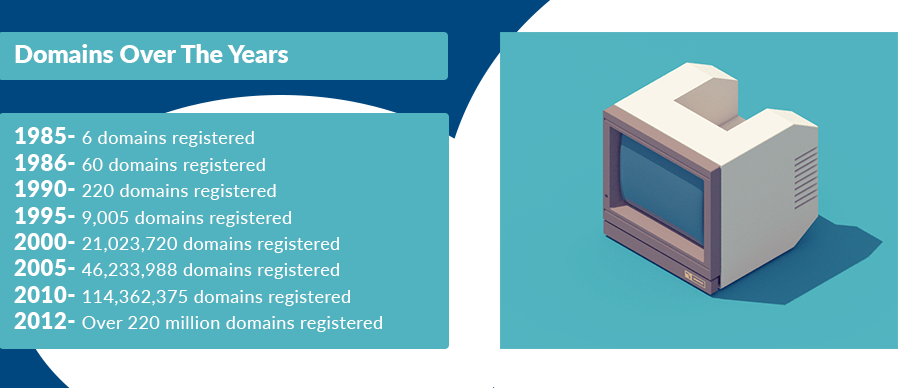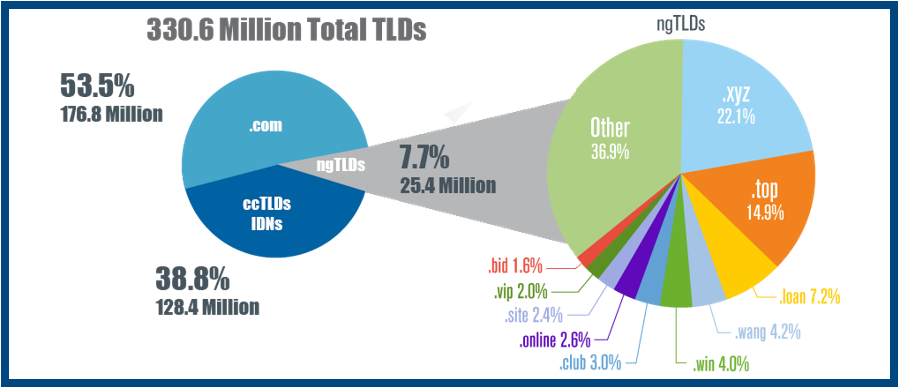When the Internet first began in 1985, there were only a few domain options you could choose from. The original top-level domains such as .com, .net. org, .edu and .gov, were designed to categorize websites based on their subject matter. Over the years, the .com domain which derives from the word commercial has become the most well-known domain ending. Today there are many options with the New Generic Top-Level Domains (ngTLD) program.

Credit: Domain Investing
In 2012 there were over 220 million domains registered, a huge growth in less than 20 years! 2012 was also the year that the first round of new generic domains launched. This program offers more relevant and keyword rich domains endings to categorize the Internet even further. Today there are over 1,200 new domain endings with more coming out every year, such as the most recent .app domain launch!

Credit: Verisign
However impressive it is that one domain extension accounts for more than 50% of all domains registered, that means there is still a whole other half of the Internet using other domain extensions. When you are traveling in other countries it is common to see country code domains like .FR when you’re browsing the web in France and .AI domains in Anguilla. .com has become so popular in the United States (where the Internet started) it’s become our defeacto ccTLD – although we have one, it’s .US you do not see it being used as frequently as country code domains in other nations.
The ngTLD representation in the total top-level domains is small but there are advantages that come from this. Fewer domain registrations in the ngTLD space mean more opportunity for companies to register a short and memorable domain for their website.
What does your domain name say about your business?

Credit: Domain Name Sales
Domain names are like real estate, and just like anything else in business, it’s all about location. The downside of .com is that is a saturated namespace. Most of the premium, generic .coms such as cupcakes.com have been registered long ago and if they are available they will cost you an arm and a leg to acquire. New businesses and startups are created every day, and mom and pop shops are finally realizing they can’t avoid having a website any longer if they want to succeed in today’s market. All of these companies that are late to the game are left with long and complicated .coms or perhaps they can consider registering their business domain with a ngTLD.
Companies always ask us how many domains they should own for their brand. The answer is there is no magic number. Some brands find success with only having one domain name and others use multiple domain strategies with a combination of country code domains for brand protection from international cybersquatting and a ngTLD for marketing campaigns. There is no one size fits all answer when it comes to establishing a domain strategy for online success.
ngTLD keywords provide hidden value
Domain Authority (DA) is a score on a scale of 1-100 that rates the quantity and quality of inbound links pointing to a website. A case study conducted by the Domain Name Association (DNA) found that ngTLDs needed only an average score of 4 to rank while .coms had to fight much harder to be seen, due to other factors such as having keywords in the domain name and domain ending.
Choosing a relevant domain extension offer advantages in organic search results and ranking for qualified keywords in paid marketing. A user searching for information on cupcakes is more likely to click a website address that has the keyword they were searching for in the domain name. For many people, the domain name is one of the first pieces of information they analyze when deciding which website to visit. Website addresses that look suspicious are highly less likely to be selected over a keyword rich domain name. It’s the same reason we are taught to skim the domain sender in an email. It gives clues as to the legitimacy of a website and its content.
Websites with new domains like the .IO domain do not need years of domain authority to rank for competitive and lucrative searches happening each day. A business can establish an online presence with less effort by having keywords in the domain before and after the dot with a ngTLD.
